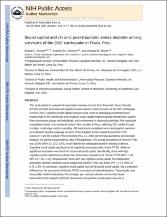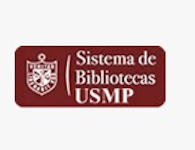| dc.contributor.author | Flores, Elaine C. | |
| dc.contributor.author | Carnero, Andres M. | |
| dc.contributor.author | Bayer, Angela M. | |
| dc.date.accessioned | 2020-07-08T15:52:05Z | |
| dc.date.available | 2020-07-08T15:52:05Z | |
| dc.date.issued | 2014-01 | |
| dc.identifier.citation | Flores EC., Carnero AM., Bayer AM. Social capital and chronic post-traumatic stress disorder among survivors of the 2007 earthquake in Pisco, Peru. Soc Sci Med. 2014; 101: 9-17. | es_PE |
| dc.identifier.uri | https://hdl.handle.net/20.500.12727/6303 | |
| dc.description.abstract | This study aimed to evaluate the association between chronic Post-Traumatic Stress Disorder (PTSD) and both structural and cognitive social capital in adult survivors of the 2007 earthquake in Pisco, Peru. Cognitive social capital measures trust, sense of belonging and interpersonal relationships in the community and structural social capital measures group membership, support from community groups and individuals, and involvement in citizenship activities. We conducted a population-based cross-sectional study in five counties in Pisco, selecting 1012 adults through complex, multi-stage random sampling. All participants completed socio-demographic questions and validated Spanish-language versions of the Adapted Social Capital Assessment Tool (SASCAT) and the civilian PTSD checklist (PCL-C). After performing descriptive and bivariate analyses, we carried out prevalence ratio (PR) regression. The overall prevalence of chronic PTSD was 15.9% (95% CI: 12.3, 19.8), much higher than anticipated based on existing evidence. Cognitive social capital was found to be negatively associated with chronic PTSD, while no significant association was found for structural social capital. Specifically, those with high cognitive social capital had an almost two times lower prevalence of chronic PTSD (PR = 1.83, 95% CI: 1.50, 2.22) compared with those with low cognitive social capital. No independent association between structural social capital and chronic PTSD was found (PR = 1.44, 95% CI: 0.70, 2.97). In conclusion, cognitive social capital, but not structural social capital, has a protective influence on the occurrence of chronic PTSD in survivors of natural disasters. These results may have public health implications. For example, pre- and post-disaster community-based interventions that catalyze and foster dimensions of cognitive social capital may aid in ameliorating the effect of earthquakes and other natural disasters on populations with high vulnerability to such events and poor access to mental health and other support services. | es_PE |
| dc.format.extent | pp. 9-17 | es_PE |
| dc.language.iso | eng | es_PE |
| dc.publisher | Elsevier Ltd. | es_PE |
| dc.relation.ispartof | urn:issn:1932-6203 | |
| dc.relation.ispartofseries | Social Science & Medicine;vol. 101 | |
| dc.relation.uri | https://www.ncbi.nlm.nih.gov/pmc/articles/PMC4083018/ | es_PE |
| dc.relation.uri | https://doi.org/10.1016/j.socscimed.2013.11.012 | es_PE |
| dc.rights | info:eu-repo/semantics/openAccess | es_PE |
| dc.rights.uri | https://creativecommons.org/licenses/by-nc-nd/4.0/ | es_PE |
| dc.source | Repositorio Académico USMP | es_PE |
| dc.source | Universidad San Martín de Porres - USMP | es_PE |
| dc.subject | Trastornos de estrés traumático | es_PE |
| dc.subject | Capital social | es_PE |
| dc.subject | Apoyo social | es_PE |
| dc.subject | Terremotos | es_PE |
| dc.title | Social capital and chronic post-traumatic stress disorder among survivors of the 2007 earthquake in Pisco, Peru | es_PE |
| dc.type | info:eu-repo/semantics/article | es_PE |
| thesis.degree.name | Medicina Humana | es_PE |
| thesis.degree.grantor | Universidad de San Martín de Porres. Facultad de Medicina Humana | es_PE |
| thesis.degree.discipline | Medicina | es_PE |
| dc.subject.ocde | https://purl.org/pe-repo/ocde/ford#3.02.00 | es_PE |








